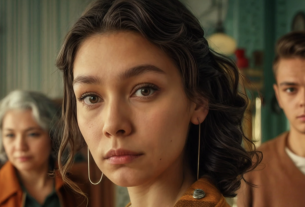Olga gripped the steering wheel tightly when she heard those words. In the rearview mirror she could see the satisfied face of Valentina Petrovna, who had settled comfortably into the back seat with a bag stuffed full of medicines and cosmetics.
“Sorry, what?” Olga asked, hoping she’d misheard.
“What’s hard to understand?” her mother-in-law’s voice carried its usual metallic notes. “I’m a sick woman; I’m going to a health resort. Someone has to look after the apartment. You’re not working right now.”
Olga was indeed on maternity leave with her one-year-old daughter, but that hardly meant she had oceans of free time. Valentina Petrovna, however, thought otherwise. In her view, if a daughter-in-law stayed home, that meant she lazed about.
“Valentina Petrovna, I thought we were just talking about watering the plants…”
“‘Thought’!” the mother-in-law snorted. “You’re always thinking the wrong thing. I told you clearly: clean up, do the laundry, wash the fridge. And not just that. It wouldn’t hurt to wipe the windows, put the storage room in order. Otherwise I’ll come back to a neglected home.”
Olga felt the muscles in her neck tighten. Two years of marriage had taught her to recognize those moments when Valentina Petrovna stepped into the role of martyr and benefactress simultaneously. Usually such attacks occurred before important family events—birthdays, holidays—when Olya and Andrey planned to spend time together.
“Andrey promised to take Masha to the zoo on Saturday,” Olga ventured carefully.
“Andrey?” her mother-in-law’s voice jumped an octave. “And who is going to help his mother? I, for your information, will come back from the sanatorium weakened, I’ll need someone to buy groceries, carry the bags. My blood pressure spikes; my heart aches.”
Olga sighed inwardly. Valentina Petrovna’s heart hurt only at the moments when she needed her son’s help. The rest of the time she dashed around the city with enviable energy, meeting friends, going to the market with heavy bags, and even managing to move furniture when she decided to rearrange things.
“Maybe we can arrange something,” Olga suggested diplomatically. “You can order groceries with delivery…”
“Delivery!” Valentina Petrovna was indignant. “And how am I supposed to check the quality? How do I choose the very best? Do you want me to eat some kind of garbage?”
They pulled up to the sanatorium. Olga helped her mother-in-law unload the suitcases and escorted her to registration. Despite her complaints about her health, Valentina Petrovna walked briskly up the steps, dragging a heavy suitcase behind her until Olga caught up and took the bags from her.
The lobby of the sanatorium had a festive feel. Guests in tracksuits and good spirits were checking in, discussing the procedures ahead. It was clear that most had come not to be treated, but to relax.
“What referral do you have?” the administrator asked Valentina Petrovna.
“What difference does it make?” she said, surprised. “I have a voucher, that’s all.”
“Just to understand which procedures are indicated for you,” the young man explained patiently.
“Everything is indicated for me. I’m a sick woman.”
Olga grew alert. Something about this exchange bothered her. Andrey had said his mother had a doctor’s referral, that she needed treatment. And here—something didn’t add up.
“May I speak with the attending physician?” she asked the administrator. “I’d like to clarify the specifics of the treatment.”
Valentina Petrovna shot her a displeased look but said nothing.
The chief physician turned out to be a pleasant man in his middle years, who readily explained the situation.
“Your mother-in-law’s test results are excellent,” he said, leafing through the medical chart. “No serious illnesses. The voucher is for preventive care, general wellness. At her age it’s very useful to do some massages, baths, and breathe the forest air.”
“So there are no medical indications?”
“Oh, not at all!” the doctor laughed. “Indications are when a person is actually ill. This is just a normal vacation that’s good for one’s health. A wonderful practice, by the way. Prevention is better than any treatment.”
Olga nodded slowly. So, no illness. A regular holiday that Valentina Petrovna decided to portray as a vital necessity. And on the back of this “vital necessity,” demand a deep clean of her apartment from her daughter-in-law.
When she returned to the lobby, Valentina Petrovna had already received her keys and was preparing to go up to her room.
“Well? Find out everything?” her mother-in-law asked with a sneer.
“Yes,” Olga replied calmly. “The doctor said your health is excellent and you’ve come simply to rest.”
Valentina Petrovna’s face changed instantly. The benevolence vanished, replaced by something predatory.
“So that’s what you’re like,” she hissed through her teeth. “Heartless. Lazy. You can’t help an elderly person, and on top of that you go questioning the doctors. What if I have hidden illnesses? What if I feel bad but the tests don’t show it?”
“Valentina Petrovna…”
“If you don’t want to help, then don’t!” her voice grew louder and louder, drawing the attention of other guests. “I’ll come home and do everything myself. Sick, exhausted, but I’ll do it. Then you can go around telling everyone what a good wife you are and how awful your mother-in-law is.”
Olga felt her cheeks burn. She wanted to snap back, to put her in her place, but years of family life had taught her restraint. Scenes with Valentina Petrovna always ended the same way: tears, complaints to Andrey, accusations of disrespecting one’s elders.
“Have a nice rest,” Olga said evenly. “See you in two weeks.”
She turned and headed for the exit, feeling her mother-in-law’s angry stare on her back.
The drive home felt endless. Olga replayed the conversation in her head, and with each minute her indignation grew. It wasn’t the request for help with cleaning that angered her—in the end, helping a relative is no sin. It was the deceit, the manipulation, the constant pressure.
Andrey met her at the door with Masha in his arms. Their daughter reached out to her joyfully, and for a moment Olga forgot all her problems as she pressed the warm little body to her.
“So, did you get her there?” her husband asked, settling their daughter into the playpen.
“I did. And you know what?” Olga sat down next to him on the couch. “Your mother isn’t sick at all.”
“What do you mean?” Andrey was surprised.
Olga told him about the conversation with the doctor, about her mother-in-law’s reaction, about the demands for a full clean. Andrey listened, frowning more and more.
“You see,” Olga said when she finished, “I’m not against helping. But why lie about it? Why not just say, ‘Kids, I want to relax for two weeks. Could you keep an eye on the apartment?’ Why these theatrics with illnesses, doctors, complaints?”
Andrey was silent, mulling it over. He loved his mother, but deep down he knew his wife was right. Valentina Petrovna really did like to complicate simple things, turning any request into a drama.
“And you know what’s most upsetting?” Olga went on. “She thinks that because I’m on maternity leave, I have nothing to do. As if a one-year-old isn’t work. As if the house cleans itself and lunches cook themselves.”
“Mom always thought that way,” Andrey sighed. “I remember when my sister was little, Dad worked three shifts, and Mom would say he was resting at work from the chores at home.”
“So what am I supposed to do now? Go clean for her?”
“Let’s not,” Andrey said unexpectedly.
Olga looked at her husband in surprise. Usually he tried to find a compromise, to persuade his wife to put up with things, to smooth over the conflict.
“What do you mean?”
“I mean, let’s not. We won’t. We’ll water the plants—that we planned anyway. But we won’t do a deep clean in the apartment of a healthy person who’s just vacationing at a sanatorium.”
“And what about the scandal afterward?”
“There won’t be a scandal,” Andrey smirked. “Mom isn’t ill. She told the doctor herself she feels great. Which means she can clean herself.”
For the first time in a long while, Olga felt that her husband was on her side. He wasn’t trying to persuade her to endure it for the sake of family harmony, wasn’t asking her to make allowances for a sick mother. He simply supported her.
“Aren’t you afraid of how she’ll react?”
“You know,” Andrey took Masha onto his lap, “I’m tired of these endless demands. Drive me here, pick me up there, wash the windows, buy the groceries. And always at the exact moment when we have plans. Remember how she suddenly got sick on your birthday and asked us to urgently bring her medicine?”
Olga nodded. Of course she remembered. They were going to a restaurant; they’d even reserved a table. And in the end they spent the whole evening at Valentina Petrovna’s, who complained about her heart and demanded they not leave her alone.
“And then it turned out she had the medicine, it was just in a different box.”
“So what do you suggest?”
“I suggest we start saying ‘no’ when the requests are unreasonable. Helping a sick person is sacred. But dancing to the tune of a healthy person who invents illnesses to get her way—that’s not very healthy.”
They spent the entire evening discussing the situation. They recalled countless instances when Valentina Petrovna used various ploys to get what she wanted. She’d suddenly fall ill when asked to watch the granddaughter. She’d complain about loneliness when the young couple wanted to spend a weekend together. She’d start talking about how hard her life was whenever she sensed that her son and daughter-in-law were too happy.
“Remember,” Andrey laughed, “how she ‘broke’ her leg before our wedding?”
“How could I forget! She walked in a cast for two weeks, demanded to be cared for. And then it turned out it was just a bruise, and the doctor recommended an elastic bandage, not a cast.”
“She asked them to put the cast on herself; said it made her feel more at ease.”
They laughed, recalling the “artistry” of Valentina Petrovna, and Olga realized she wasn’t the only one facing such behavior. Andrey had simply gotten used to it, resigned himself, learned not to pay attention to minor manipulations. But the scale of the demands had grown, and their patience was running out.
The next few days passed quietly. Olga went to her mother-in-law’s twice to water the plants and check that everything was in order. The apartment was in its usual state—not perfectly clean, but not dirty either. The fridge worked fine; the washing machine was full, which showed that her mother-in-law hadn’t even bothered to do the laundry before leaving.
Valentina Petrovna called every day, asking detailed questions about how things were going and whether Olga had started cleaning yet. When she got evasive answers, she grew irritated, but couldn’t say anything concrete—after all, she was at the sanatorium, undergoing “treatment.”
“How’s the cleaning going?” she asked in yet another call.
“Everything’s fine, Valentina Petrovna,” Olga replied. “I’m watering the plants and keeping an eye on the apartment.”
“Did you wash the fridge?”
“Haven’t gotten to it yet; there’s a lot to do with Masha.”
“That’s what I’m saying—you’re lazy!” the mother-in-law fumed. “You sit at home all day and don’t do a thing.”
After such conversations, Olga became ever more convinced they’d made the right decision. Someone who truly needs help doesn’t behave like that. They’re grateful for the little, not demanding of more.
Andrey supported his wife, but she could tell it wasn’t easy for him. All his life he had been an obedient son, fulfilling his mother’s requests, unused to resisting. But he also didn’t want to watch his wife turn into his mother’s service staff.
“Maybe we should at least wash the fridge?” he suggested one day. “So there won’t be a scene.”
“Andrey,” Olga said gently, “if we give in now, she’ll understand she can demand anything under the pretext of illness or age. And tomorrow she’ll demand something else. Where’s the line?”
He nodded, recognizing his wife’s logic, though the anxiety didn’t leave him. His mother could create a scene of epic proportions.
Valentina Petrovna returned from the sanatorium rested and satisfied. She was tan, had put on a little weight, looked healthy and energetic. There wasn’t a hint of illness or fatigue.
“So, how are things?” she asked the moment she crossed the threshold. “Did you clean?”
“Mom, come in, have a seat,” Andrey offered. “Tell us how your trip was.”
“I’ll tell you later. First I want to see what went on here without me.”
She went to the kitchen, opened the fridge, peered into the washing machine. Her face darkened bit by bit.
“The fridge hasn’t been washed!” she declared indignantly. “The laundry isn’t done! What did you do for two weeks?”
“I watched over the apartment and watered the plants,” Olga replied calmly.
“I told you clearly—clean up, do the laundry, wash the fridge!”
“‘While I’m on vacation, clean my place, do all the laundry, and wash the fridge,’—that’s what you ordered before you left for the sanatorium,” Olga quoted. “I remember your words. But you forgot to specify that it’s a vacation, not treatment.”
Valentina Petrovna was taken aback. She hadn’t expected her daughter-in-law to speak so plainly about her deception.
“What does treatment or vacation have to do with anything?” she tried to object. “I’m an older person; things are hard for me…”
“Mom,” Andrey stepped in, “you look great. You had a good rest. And your apartment is in normal condition. Why demand a deep clean?”
“What do you mean why?” her voice climbed higher. “Who will take care of me when I’m truly old? Who will look after my grave?”
“Don’t dramatize, Mom. You’re only fifty-eight, you’re healthy and full of energy.”
“Fifty-eight is already an age!” she protested. “People my age are already retiring.”
“But they don’t pretend to be ill to force relatives to clean their apartment,” Olga said firmly.
A heavy silence fell. Valentina Petrovna looked from her son to her daughter-in-law, trying to understand what had changed in their attitude toward her.
“So you refuse to help me?” she said at last.
“We’re not refusing to help,” Andrey replied. “We’re refusing to fulfill unreasonable demands based on false information.”
“If you really need help,” Olga added, “we’ll be happy to help. But not under threats and not through deceit.”
For a while, Valentina Petrovna said nothing, thinking it over. She realized her usual scheme no longer worked. The children had grown up, the daughter-in-law was no longer going to silently tolerate her whims, and her son had begun to side with his wife instead of his mother.
“Fine,” she said at last. “We’ll see how you sing when I really do get sick.”
“Then we’ll be there,” Andrey answered calmly. “As children should be.”
After his mother left, Olga exhaled with relief. For the first time in a long while, she felt she could breathe freely, that she didn’t have to tiptoe around for fear of hurting someone’s feelings.
“Do you think she understood?” she asked her husband.
“I think so. Mom may love to boss people around, but she isn’t stupid. She realized the old scheme isn’t working.”
“Don’t you feel sorry for her? She’s still your mother.”
Andrey hugged his wife and kissed her temple.
“You know, I don’t feel sorry for her so much as for the time we’ve wasted on these games. Mom is healthy, active, she has an interesting life. And we’ve been wasting our nerves on showdowns instead of simply loving each other.”
A week later, Valentina Petrovna called and, without any preamble, said:
“Andrey, could you help me with groceries on Saturday? It’s hard to carry heavy bags.”
“Of course, Mom. What time suits you?”
“I won’t be getting in the way of your plans?”
“No, Olya and I were planning to take Masha for a walk. We’ll drop by you as well.”
It was the first time his mother asked about their plans before voicing her request.
Gradually, the family relationships began to improve. Valentina Petrovna still liked to command and to express her opinion on every matter, but she stopped using illnesses as a means of pressure. Olga learned to calmly stand her ground without escalating into conflict. And Andrey realized that being a good son doesn’t mean fulfilling every whim of one’s mother.
As it turned out, family life requires not only love and patience, but also honesty and the ability to say “no” at the right moment. And when everyone in the family understands that, life becomes much simpler and more peaceful.



